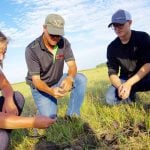SASKATOON – If rural governments band together, they can have an impact on the future of the grain handling and transportation systems, says an official with the Saskatchewan Association of Rural Municipalities.
And if they don’t unite, said SARM director Ron Gleim, they might not like the results.
“If we do nothing, we’re going to be living with a system that others are going to design and we’re going to pay for,” he told a recent meeting of RM officials here.
Gleim is head of a group of RMs in Saskatchewan’s southwest that has been working for the past couple of years to develop a grain transportation plan for that region.
Read Also

Farming Smarter to hold Agronomy Battles series
Southern Alberta non-profit research institute hope grassroots sessions with producers help focus future research on cover crops, strip tillage and herbicide resistance
He said the experience of the Southwest Transportation Advisory Council has shown if RMs get together, they can have an equal place at the table with the railways and grain companies that have traditionally held all the cards in the transportation planning game.
“We’d recommend that the rest of the province get organized,” he said in an interview later. “We know the clout that we have when we go to stakeholders. If the province got involved and all the municipalities, they would have 10 times the influence and respect from the rest of the industry.”
He said local governments should also realize they already hold a few aces.
For example, a grain company might decide it wants to build an inland terminal in a location that would cost the municipality $1 million a year in additional road maintenance and repair costs.
In such a case, an RM could use zoning regulations to prohibit construction or refuse to provide services.
Co-operation necessary
“We don’t want to do that and that’s why we have to sit down and talk with stakeholders. We’re all in this together,” he said, adding that his group has had excellent co-operation from all the other players in the industry.
The southwest council was to hand in a report to the provincial government June 30 outlining the various grain transportation options available.
Gleim said the council has decided to continue its work for another year and will be meeting soon with stakeholders to go over options in more detail and develop a detailed plan for the region.
The group has also applied for $25,000 from the federal government’s Crow transition infrastructure fund to do a more detailed study of some of the options, particularly short-line rail service.
In an interview later, he said short-line companies are showing great interest in Saskatchewan in general and the southwest in particular.
Gliem said there’s a good chance the looping CP Rail line in the southwest that runs from Val Marie to Assiniboia and eventually to Moose Jaw could end up as a short line.














